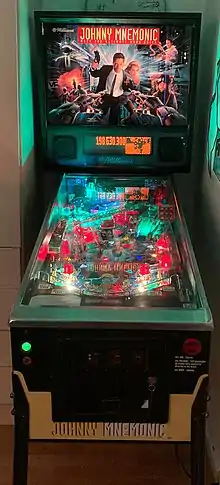 Johnny Mnemonic pinball machine from 1995 | |
| Manufacturer | Williams Electronic Games, Inc |
|---|---|
| Release date | August 1995 |
| System | Williams WPC Security (WPC-S) |
| Players | 4 |
| Design | George Gomez |
| Artwork | John Youssi |
| Multiball | 4 |
| Production run | 2,756 units |
Johnny Mnemonic is a 4 player pinball machine from August 1995, manufactured by Williams Electronic Games, Inc. A total of 2,756 units were produced.[1][2][3][4][5]
Description
Johnny Mnemonic is a 1995 pinball machine based on the movie of the same name, created by George Gomez and Williams Electronics, with artwork by John Youssi. Designer George Gomez had been inspired by author William Gibson's original cyberpunk short story Johnny Mnemonic, but based the game and its features, such as a player-controlled glove that used a magnet to lift the ball off the playfield, on the film's assets. Unfortunately, the film was a box office failure, and its poor showing affected sales of the game despite high pinball ratings.[6][7] Although, today the movie is considered undervalued. According to inverse.com, Johnny Mnemonic is an overlooked gem in Reeves’ filmography that does deserve to sit in the shadow of The Matrix.[8]
In 1995, the Johnny Mnemonic movie didn't become the blockbuster movie that Williams may have hoped for when obtaining the license. But the machine is heavily underrated according to Pinside, TV-tropes and Paste Magazine..[1][9][10] The same thing happened to "The Shadow" machine.[11] The fast gameplay, strong sounds (although not 'custom' sampled from the real actors) and incredibly fun rules make this one of those "must have played" machines according to Pinside.[1]
This game ranks #106 in the Pinside Pinball Top 100. It has received 353 approved Pinsider ratings and currently has a rating of 7.788 out of 10.[1] Average Fun Rating on Internet Pinball Database is 7.8/10 (108 ratings/78 comments).[2]
The Johnny Mnemonic pinball machine is also depicted and analyzed in the acclaimed book Pinball Wizards: Jackpots, Drains, and the Cult of the Silver Ball by Adam Ruben in 2017.[12]
According to research paper from 2007 (TEXT Technology), Andrea Austin highlights, that the Johnny Mnemonic pinball game portrays a stylized cyberspace and torn fragments of comic book code along with Johnny on the board surface as an interestingly nostalgic twist.[13]
Notable Features
Cyber Matrix Ball Lock assembly, featuring nine slots that each hold a 'per-game-random' award. Magnetic hand (data hand / cyber- glove) assembly that 'catches' the ball. The player can then move the hand over the "Cyber Matrix" with the four flipper buttons and release the ball into one of the nine slots. Power Down is wizard mode, which shuts down the pin, part for part, while you need to keep four balls from draining. A bit similar to the end game of "The Shadow", where you shoot all lights out until the pin shuts down.[1][14] The four flipper buttons control a 'pacman-like' creature that bounces around the Dot Matrix Display.[3] Johnny Mnemonic has also a 'Midnight Madness' mode. When the internal clock hits midnight, a special mode will be active.[1] For more on Rule Sheets and features[14][9]
Marketing
The Marketing slogans are "Meet the ultimate hard drive.", "Gigabytes / Gigabucks.", "The Ultimate Mind Game", "Get Johnny Mnemonic and you'll be in the Mnemoney."[1]
In 'attract' / standby mode (intended to get peoples attention at an arcade) a character named J-Bone says: "Don't be a zombie — play pinball!"[9]
See also promo video for the 1995 Williams Pinball Johnny Mnemonic[15]
The voice of the powerdown virtual character is done by famous American pinball and video game designer Steve Ritchie.[16][1]
During Johnny Mnemonic's "Frenzy" mode, be sure to pay attention to the voice calls. You will hear the familiar laugh of one of Williams' more famous characters...Funhouse's Rudy.[17] Also listen for J-Bone, as he will ask for a hot dog (ala Funhouse).[1]
Cybernetic support is listed on the machine's playfield, which for example consists of the renowned professional pinball player, Roger Sharpe.[2]
References
- 1 2 3 4 5 6 7 8 9 "Pinside.com on Johnny Mnemonic Pinball machine". pinside.com.
- 1 2 3 "Internet Pinball Database on Johnny Mnemonic | IPD No. 3683 / August 08, 1995 | 4 Players". Internet Pinball Database.
- 1 2 Rossignoli, Marco (2011). The Complete Pinball Book: Collecting the Game & Its History (Rev. 3rd ed.). Schiffer Publishing, Ltd.; 3rd edition. pp. 312, 235. ISBN 978-0764337857.
- ↑ Shalhoub, Michael (2012). The Pinball Compendium: 1982 to Present. Schiffer; 2nd Edition Revised and Expanded with Updated Price Guide (February 23, 2012). p. 203. ISBN 978-0764341076.
- ↑ Pacak, Mike (1997). Mike Pacak's Pinball Flyer Reference Books (three volumes). The pingame journal (January 1, 1997). ASIN B00A9JGPZG.
- ↑ McNamara, Chris (Nov 27, 2005). "Pinball's still in play". Chicago Tribune.
- ↑ "Pinball machine: Johnny Mnemonic Pinball Machine". artsandculture.google.com.
- ↑ Francisco, Eric (November 1, 2021). "You need to watch the most underrated Keanu Reeves sci-fi movie on Netflix ASAP".
- 1 2 3 "TV Tropes - Pinball | Johnny Mnemonic". tvtropes.org.
- ↑ Burt, Preston (March 5, 2015). "11 Pinball Machines Better Than the Movies They're Based On". Paste Magazine.
- ↑ "The Shadow (pinball) on Wikipedia".
- ↑ Ruben, Adam (November 1, 2017). Pinball Wizards: Jackpots, Drains, and the Cult of the Silver Ball (First ed.). Chicago Review Press. p. 208. ISBN 978-1613735916.
- ↑ Austin, Andrea (November 2007). "The Film/Game: Narrative Form and Network Conditioning" (PDF). TEXT Technology. Number 1: 111.
- 1 2 Derr, Rich. "Internet Pinball Database Rulesheet for Johnny Mnemonic Pinball".
- ↑ Jan van den Munckhof. "Johnny Mnemonic Pinball Promo Video". YouTube.
- ↑ "Steve Ritchie (pinball designer) on Wikipedia".
- ↑ "FunHouse (Pinball machine) on Wikipedia".